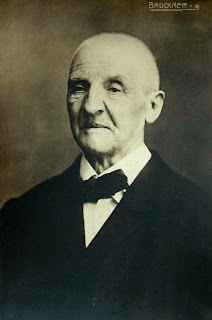Information
Composer: Anton Bruckner
- Symphony No. 7 in E major (1885, ed. Haas): 1. Allegro moderato
- Symphony No. 7 in E major (1885, ed. Haas): 2. Adagio. Sehr feierlich und sehr langsam
- Symphony No. 7 in E major (1885, ed. Haas): 3. Scherzo. Nicht schnell - Trio. Langsam
- Symphony No. 7 in E major (1885, ed. Haas): 4. Finale. Bewegt, doch nicht schnell
Royal Concertgebouw Orchestra
Bernard Haitink, conductor
Date: 1978
Label: Philips
--------------------------------------------------------------------------
Review
This is the second of Haitink’s four (!) recordings of this symphony, made in 1978. There’s been a lot of bad Bruckner recently, an artifact of the need of modern conductors who feel uncomfortable with the forms of the German classics, sonata form in particular. Now of course Bruckner grew up with this tradition and believed that he was working with traditional symphonic structures, but the fact remains that his “stop and go” first movements and finales never require the conductor to create and sustain the kind of tension and momentum that we find in, say, Beethoven or Brahms (never mind Haydn or Mozart). As a result, he has become the flavor of the decade, especially among modern music specialists who need to find music to program that a normal audience might conceivably sit through.
Bruckner does, however, have his own sense of momentum, and however many pauses he may have written between sections, the best performances capture and project the music’s flow. This one does it as well as any ever has. The playing of the Concertgebouw is gorgeous; the strings glow, the brass are ideally balanced, and Haitink paces each movement to perfection. The first movement isn’t rushed, but it has the requisite energy, while the Adagio rises to a climax that’s positively apocalyptic. Both the scherzo and finale are fresh and bracing, with the coda of the latter not upstaged by that of the first movement. It should be mandatory listening for all young conductors who play Bruckner for reasons that don’t allow them even to begin to plumb the music’s expressive depths.
-- David Hurwitz, ClassicsToday
More info & reviews:
http://www.amazon.com/Bruckner-Symphony-No-7/dp/B00000E3LP
http://www.amazon.com/Bruckner-Symphony-No-7/dp/B00000E3LP
--------------------------------------------------------------------------
Anton Bruckner (4 September 1824 – 11 October 1896)) was an Austrian composer. His symphonies are considered emblematic of the final stage of Austro-German Romanticism because of their rich harmonic language, strongly polyphonic character, and considerable length. Bruckner composed eleven symphonies, scored for a fairly standard orchestra. His orchestration was modeled after the sound of his primary instrument, the pipe organ.
http://en.wikipedia.org/wiki/Anton_Bruckner
http://en.wikipedia.org/wiki/Anton_Bruckner
***
Bernard Haitink (born 4 March 1929) is a Dutch conductor. In his glowing career, he is the principal conductor of the Royal Concertgebouw (1959-1988), London Philharmonic (1967-1979), Chicago Symphony (2006-2010) and and principal guest conductor Boston Symphony (1995-2004). Haitink has conducted and recorded a wide variety of repertoire, with the complete symphonies of Beethoven, Brahms, Schumann, Tchaikovsky, Bruckner, Mahler, Shostakovich and Vaughan Williams, and the complete piano concertos of Beethoven and Brahms with Claudio Arrau notable among his recordings.
http://en.wikipedia.org/wiki/Bernard_Haitink
http://en.wikipedia.org/wiki/Bernard_Haitink
------------------------------------------------------------------
FLAC, tracks
Links in comment
Enjoy!





This comment has been removed by the author.
ReplyDeleteHoozah! Thank you so much.
ReplyDeleteMEGA
ReplyDeletehttp://adf.ly/1HTcDt
Fabulous! Thank you.
ReplyDelete